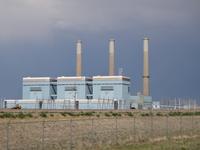What do we call asking non-voters what they'd vote for?
Michael O'Leary

Laramie River Station, Wheatland, WY
With yesterday's headline "Survey Finds Support For Coal Transport Through NW" OPB trumpeted political support for an issue....as demonstrated by a survey of people so unrepresentative of the voting public that 12% of their sample isn't even registered to vote.
Looking in to their cross tabs, I'm surprised to see so few senior citizens counted, and I'm also surprised to see a dearth of college educated voters. It just doesn't seem like a set of likely voters to me.
Which, of course, it isn't.
The ole person-on-the street quotes are a well aged tradition in news reporting, and we know not to put too much stock in their quote of the day.
That's exactly why we the news consuming public look to survey research to help us understand what's really on the minds of our neighbors.
But when news reporters offer up a survey that doesn't reflect the voting public, well, I won't be putting too much stock in that either.
Not by quite a margin.
 |
More Recent Posts | |
Albert Kaufman |
|
Guest Column |
|
Kari Chisholm |
|
Kari Chisholm |
Final pre-census estimate: Oregon's getting a sixth congressional seat |
Albert Kaufman |
Polluted by Money - How corporate cash corrupted one of the greenest states in America |
Guest Column |
|
Albert Kaufman |
Our Democrat Representatives in Action - What's on your wish list? |
Kari Chisholm |
|
Guest Column |
|
Kari Chisholm |
|
connect with blueoregon



9:50 a.m.
Jul 26, '12
Full Disclosure: I let my membership in OPB lapse but I'll likely re-up in the next drive. I work to support renewable energy projects and protect the interests of outdoor recreationalists, including things like coal trains. I also think the CRC is costly and risky.
9:52 a.m.
Jul 26, '12
Hey Michael - thanks for the digging.
I was impressed by the sample size (1,200) and then noticed it was an online poll. It would be interesting to know how DHM develops their panel for this work (though I know that is almost certainly proprietary).
DHM discloses their methodology here: http://dhmresearch.com/what-we-do/methods/ and they acknowledge under representation of some populations in online samples.
Earthfix did not disclose it was an online survey in their story, though to their credit they did provide a copy of the full survey on their website.
As opinion testing instruments get more varied, it would be great if media can provide context on the relative strengths and weaknesses of those methods. But failing that, your post is a great reminder that we may have to do that digging ourselves.
10:07 a.m.
Jul 26, '12
I think I'm going to quibble with the entire thrust of this post. (Sorry, Mike.)
It doesn't appear that either the pollster or their sponsor claimed to have polled voters. The OPB story says "residents" and the polling methodology refers to "the general population".
Now, voters would be better - if you're studying something election-related, but there are perfectly valid reasons to survey the general population too.